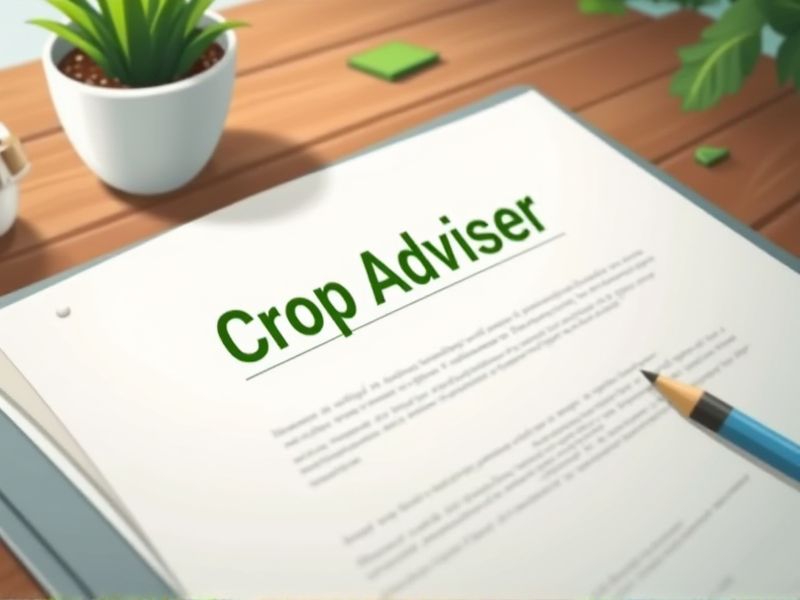
In the agricultural sector, crop advisers play a crucial role in optimizing farm productivity and sustainability, requiring specialized knowledge. Certifications serve as a standardized measure of expertise, ensuring advisers are equipped to handle diverse challenges such as pest management and soil conservation. The right certifications enhance credibility, fostering trust with farmers and industry stakeholders. Key certifications are essential for a Crop Adviser Professional.
Certified Crop Adviser (CCA)
Demand for a Certified Crop Adviser (CCA) arises from the need for knowledgeable professionals who provide data-driven recommendations to enhance crop productivity and sustainability. Certification ensures these advisers meet industry standards and possess an up-to-date understanding of agronomic practices. By employing CCAs, farmers can reduce input costs and mitigate risks, resulting in increased farm efficiency and profitability. The involvement of a CCA in crop management leads to environmentally conscious decision-making that aligns with both regulatory requirements and sustainable agriculture goals.
Certified Professional Agronomist (CPAg)
The CPAg credential enhances a crop adviser's credibility, instilling trust among clients and stakeholders. This certification ensures the individual possesses advanced knowledge and expertise in agronomy, crucial for informed decision-making. CPAg-certified professionals stay updated with the latest agricultural practices, leading to improved crop yield and sustainability. With the CPAg designation, an adviser gains a competitive edge, potentially expanding their client base and career opportunities.
Nutrient Management Specialist (NMS) Certification
Crop Adviser Professionals require the Nutrient Management Specialist Certification to ensure they possess the expertise necessary for creating effective nutrient management plans, which directly impacts crop yield and soil health. Certification validates proficiency in understanding nutrient cycles and soil fertility, essential for optimizing resource use and minimizing environmental impacts. With increasing agricultural regulations, certified specialists are better equipped to comply with legal standards, reducing the risk of penalties. Certified advisers also gain credibility, enhancing client trust and potentially expanding business opportunities.
Integrated Pest Management (IPM) Certification
Integrated Pest Management (IPM) Certification equips Crop Adviser Professionals with essential skills for sustainable pest control, ensuring environmentally responsible practices. The certification validates expertise in minimizing pesticide use, aligning with increasing regulatory standards and consumer demand for eco-friendly farming. Possessing IPM Certification enhances credibility and trust among farmers and stakeholders seeking effective and sustainable pest management solutions. As crop resilience to pests becomes crucial, IPM-certified advisers guide farmers in maintaining high yields with reduced ecological impact.
Precision Agriculture Certification
Precision Agriculture Certification enhances a crop adviser's ability to use advanced technology for efficient field management. Knowledge of geospatial tools and data analytics aids in optimizing resource application, improving yield and environmental sustainability. Certification in this field fosters credibility and trust with clients seeking innovative agricultural solutions. Staying updated with technological advancements ensures advisers make informed recommendations, aligning agricultural practices with current standards.
Sustainable Agriculture Certification
Sustainable Agriculture Certification enhances a Crop Adviser Professional's credibility by ensuring they are educated in environmentally responsible practices. This certification increases their ability to recommend solutions that improve soil health and biodiversity, which are critical for long-term productivity. It empowers advisers to guide farmers in strategies that reduce greenhouse gas emissions, aligning with global climate goals. Markets increasingly demand transparency and sustainability in food production, so this certification helps advisers support their clients in meeting consumer expectations and regulatory requirements.
Soil Health Certification
Soil health certification equips crop advisers with the knowledge to accurately assess and improve soil conditions, leading to better crop yields. Enhanced understanding of soil biology and chemistry enables advisers to provide sustainable farming practices that reduce environmental impact. This certification helps in building trust with farmers, as advisers can demonstrate expertise in optimizing soil management strategies. With climate change affecting agriculture, certified professionals can offer vital solutions to adapt and maintain productive farming systems.
Crop Protection Certification
Crop protection certification ensures that crop adviser professionals possess the necessary knowledge to implement effective pest and disease management strategies. This certification validates their expertise in recommending products and practices that minimize environmental impact and enhance crop yield. By upholding professional standards, certification fosters trust and credibility among farmers and stakeholders in the agricultural sector. The acquired skills and knowledge help advisers stay updated with evolving regulations and technologies in crop protection.
Agricultural Safety Certification
Agricultural Safety Certification is needed for crop adviser professionals because it ensures they have the knowledge to implement practices that reduce the risk of accidents and injuries in the field. Certification provides credibility, which enhances trust from farmers and stakeholders who rely on accurate and safe recommendations. Certified advisers are better equipped to comply with regulations and avoid potential legal issues that may arise from unsafe agricultural practices. Understanding safety also enables advisers to guide farmers in resource management, reducing the likelihood of crop loss and damage.
Farm Business Management Certification
Farm Business Management Certification equips crop advisers with crucial financial literacy, enabling them to make informed recommendations that enhance farm profitability. It strengthens decision-making skills by integrating economic principles with agronomic practices. The certification provides advisers with tools to conduct risk assessments, helping farmers navigate market fluctuations and environmental impacts. It fosters credibility and trust among clients, distinguishing certified professionals in a competitive industry landscape.
Summary
When you, as a Crop Adviser Professional, obtain certifications, you can expect an increase in client trust and confidence. This certification validates your expertise and can lead to enhanced career opportunities. Clients often perceive certified professionals as more reliable, leading to increased business prospects. Your certified status can also open doors to advanced consultancy roles and higher earning potential.
